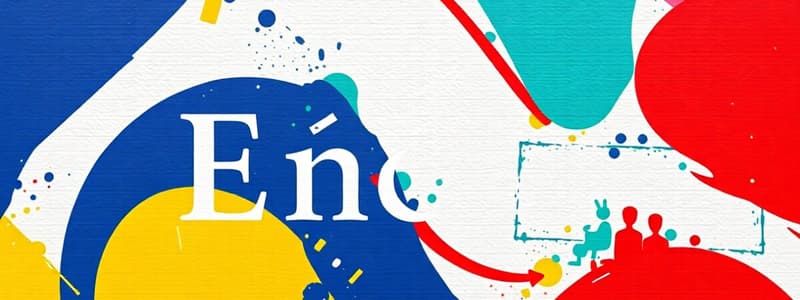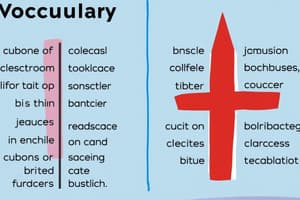Podcast
Questions and Answers
Which of the following is the British English equivalent of the American English term 'cell phone'?
Which of the following is the British English equivalent of the American English term 'cell phone'?
- Lorry
- Boot
- Bonnet
- Mobile phone (correct)
In British English, the word 'biscuit' refers to the same thing as it does in American English.
In British English, the word 'biscuit' refers to the same thing as it does in American English.
False (B)
What is the meaning of 'taking the Mick' in British English?
What is the meaning of 'taking the Mick' in British English?
Teasing someone
In British English, if someone is described as ______, it means they are very tired.
In British English, if someone is described as ______, it means they are very tired.
Match the following British English words with their American English equivalents:
Match the following British English words with their American English equivalents:
What does 'queue' mean in British English?
What does 'queue' mean in British English?
The 'r' at the end of words is always pronounced in Received Pronunciation (RP).
The 'r' at the end of words is always pronounced in Received Pronunciation (RP).
What is the British English term for studying for an exam?
What is the British English term for studying for an exam?
In British English, 'dodgy' means ______ or ______.
In British English, 'dodgy' means ______ or ______.
Match the British English grammar usage with its description.
Match the British English grammar usage with its description.
What does 'All right?' mean as a greeting in British English?
What does 'All right?' mean as a greeting in British English?
Directness is highly valued in British conversations.
Directness is highly valued in British conversations.
What does 'spend a penny' mean in British English?
What does 'spend a penny' mean in British English?
In British English, 'a cuppa' means a cup of ______.
In British English, 'a cuppa' means a cup of ______.
Match the British slang with their definitions.
Match the British slang with their definitions.
What is a 'Full English'?
What is a 'Full English'?
Discussing personal finances is generally encouraged in British social interaction.
Discussing personal finances is generally encouraged in British social interaction.
In British English, what is the common response when asked how one is doing, implying things are okay?
In British English, what is the common response when asked how one is doing, implying things are okay?
The announcement 'Mind the ______' is commonly heard on the London Underground.
The announcement 'Mind the ______' is commonly heard on the London Underground.
Match the place with the accent/dialect.
Match the place with the accent/dialect.
Which of the following is a common British English expression that means something is excellent?
Which of the following is a common British English expression that means something is excellent?
Punctuality is generally not expected in British social situations.
Punctuality is generally not expected in British social situations.
What does 'spot on' mean in British English, as used in the example conversation?
What does 'spot on' mean in British English, as used in the example conversation?
In British English, 'quid' is used instead of ______ for currency.
In British English, 'quid' is used instead of ______ for currency.
Match the following British English and American English differences.
Match the following British English and American English differences.
What does it mean if someone is 'gutted'?
What does it mean if someone is 'gutted'?
When introduced to someone the correct phrase to say is 'How do you do?' and then follow this by repeating the phrase back.
When introduced to someone the correct phrase to say is 'How do you do?' and then follow this by repeating the phrase back.
In British English what does 'to skive' mean?
In British English what does 'to skive' mean?
'______' means slightly annoyed.
'______' means slightly annoyed.
Match the following:
Match the following:
Flashcards
Crisps
Crisps
Potato chips in American English.
Chips
Chips
French fries in American English.
Biscuit
Biscuit
American cookie.
Scone
Scone
Signup and view all the flashcards
Queue
Queue
Signup and view all the flashcards
Chemist
Chemist
Signup and view all the flashcards
Lorry
Lorry
Signup and view all the flashcards
Boot
Boot
Signup and view all the flashcards
Bonnet
Bonnet
Signup and view all the flashcards
Mobile phone
Mobile phone
Signup and view all the flashcards
Holiday
Holiday
Signup and view all the flashcards
Jumper
Jumper
Signup and view all the flashcards
Trainers
Trainers
Signup and view all the flashcards
Trousers
Trousers
Signup and view all the flashcards
Revise
Revise
Signup and view all the flashcards
Rubbish
Rubbish
Signup and view all the flashcards
Non-rhotic pronunciation
Non-rhotic pronunciation
Signup and view all the flashcards
Glottalized 't'
Glottalized 't'
Signup and view all the flashcards
Broad 'a' in words
Broad 'a' in words
Signup and view all the flashcards
Collective nouns
Collective nouns
Signup and view all the flashcards
"Shall"
"Shall"
Signup and view all the flashcards
Past participle of "get"
Past participle of "get"
Signup and view all the flashcards
Prepositions
Prepositions
Signup and view all the flashcards
"Needn't"
"Needn't"
Signup and view all the flashcards
Tag questions
Tag questions
Signup and view all the flashcards
Cheers
Cheers
Signup and view all the flashcards
All right?
All right?
Signup and view all the flashcards
You alright?
You alright?
Signup and view all the flashcards
Fancy
Fancy
Signup and view all the flashcards
Taking the Mick
Taking the Mick
Signup and view all the flashcards
Study Notes
- British English conversation differs from American English in vocabulary, pronunciation, grammar, and common expressions.
- Understanding these differences is crucial for effective communication.
Vocabulary
- Many words have different meanings or are unique to British English.
- "Crisps" are potato chips, while "chips" are French fries.
- "Biscuit" refers to what Americans call a cookie, while a "scone" is similar to an American biscuit.
- "Queue" means line, both as a noun and verb ("queueing").
- "Chemist" refers to a pharmacy or drugstore.
- "Lorry" is a truck, while "boot" is the trunk of a car and "bonnet" is the hood.
- "Mobile phone" is the equivalent of "cell phone."
- "Holiday" refers to vacation.
- "Jumper" refers to a sweater.
- "Trainers" are sneakers or athletic shoes.
- "Trousers" means pants.
- Brits "revise" (study) for an exam.
- If something is rubbish it is trash.
Pronunciation
- Pronunciation varies significantly across different regions of Britain.
- The pronunciation described here is often called "Received Pronunciation" (RP), historically associated with the upper class.
- Non-rhotic pronunciation is common meaning the 'r' at the end of words or before consonants is often not pronounced (e.g., "car" sounds like "cah").
- The 't' sound can be glottalized, especially in London, where it's replaced by a glottal stop (e.g., "butter" sounds like "bu'er").
- The 'a' in words like "bath," "grass," and "dance" is often pronounced with a broad 'a' (like "father") in Southern England.
- Vowel sounds can differ; for example, the vowel in "trap" and "bath" are different.
- Some words have different stress patterns (e.g., "garage" is often stressed on the first syllable).
Grammar
- Collective nouns often take plural verbs (e.g., "The team are playing well," as opposed to "The team is playing well").
- "Shall" is more commonly used in British English for suggestions or offers (e.g., "Shall we go?").
- The past participle of "get" is often "got" rather than "gotten."
- The use of prepositions can differ (e.g., "at university" instead of "in university").
- "Needn't" is commonly used to express lack of necessity.
- Tag questions are frequently used (e.g., "It's a nice day, isn't it?").
- In British English "maths" is more common instead of "math".
Common Expressions
- "Cheers" is used to mean "thank you" or as a toast.
- "All right?" is a common greeting, similar to "How are you?".
- "You alright?" is used to ask if someone is okay.
- "Fancy" means to find someone or something attractive or to want something (e.g., "Do you fancy a cuppa?").
- "Taking the Mick" refers to teasing someone.
- "Knackered" means very tired.
- "Gutted" means very disappointed.
- “Dodgy” means suspicious or unreliable
- “Skive” means to avoid work or school
- "Bloke" is an informal term for a man.
- “Quid” is used instead of pound for currency.
- "To spend a penny" means to use the restroom.
Politeness and Formality
- Politeness is highly valued.
- Sarcasm and understatement are commonly used.
- Self-deprecation is a common form of humor.
- Directness can be seen as rude; indirect language is often preferred.
- Using "please" and "thank you" is essential, even in casual conversations.
- Apologizing, even for minor inconveniences, is common (e.g., "Sorry!").
Regional Variations
- British English has significant regional variations.
- Accents and dialects differ widely across the country, from Scottish to Geordie (Newcastle) to Cockney (London).
- Understanding the local dialect can sometimes be challenging for non-native speakers.
- Slang terms and idiomatic expressions vary by region.
Social Interaction
- Punctuality is generally expected, but a slight delay (5-10 minutes) might be acceptable.
- Queuing is taken seriously; cutting in line is frowned upon.
- Discussing personal finances or salaries is generally avoided.
- Public displays of emotion are often subdued.
- A firm handshake is a common greeting.
- The pub is a central social institution.
Idioms and Slang
- "Bob's your uncle" means "and there you have it" or "it's as simple as that."
- "Full of beans" means energetic.
- "A cuppa" means a cup of tea.
- "Dog's bollocks" means something excellent (use with caution due to its vulgarity).
- "Donkey's years" means a very long time.
- "Spend a penny" means to go to the toilet.
- "Cheeky" means playfully rude or disrespectful.
- "Bits and bobs" means small items or things.
- "Blinding" means very good.
- "Taking the piss" means to make fun of someone.
- “Kerfuffle” means a commotion or fuss.
- “Gobsmacked” means utterly astonished.
- “Miffed” means slightly annoyed.
Food and Drink
- "Tea" can refer to the drink or an evening meal.
- A "Full English" is a hearty breakfast with eggs, bacon, sausage, beans, and more.
- "Sunday roast" is a traditional Sunday meal with roasted meat, potatoes, vegetables, and gravy.
- "Pudding" can refer to dessert in general.
- "Scones" are served with clotted cream and jam, often as part of afternoon tea.
- "Bangers and mash" are sausages and mashed potatoes.
- "Spotted dick" is a steamed suet pudding with dried fruit.
Cultural Nuances
- British culture values tradition and history.
- A sense of humor is highly appreciated, often involving irony and wit.
- The weather is a common topic of conversation.
- Respect for privacy and personal space is important.
- A cup of tea is offered in almost any social situation.
- Queuing up is a national institution
- Often more reserved than other cultures, especially when first meeting someone
Common Phrases
- "How do you do?" is a formal greeting, often followed by repeating the phrase back.
- "Pleased to meet you" is a common response to an introduction.
- "Good on you" is used to express approval or congratulations.
- "Mustn't grumble" is a typical response when asked how one is doing, meaning things are okay.
- "Mind the gap" is a common announcement on the London Underground.
- “Ta” is used to say thank you.
Example Conversation
- A: "Alright, mate? Fancy a cuppa?"
- B: "Cheers, I'm knackered. Just been queueing for ages at the chemist."
- A: "Dodgy weather, innit? I'm well miffed about it."
- B: "Tell me about it. Bob's your uncle, it'll be raining cats and dogs later."
- A: "Spot on. Need to skive off early before the lorry drivers get going."
- B: "Good on you! Later mate."
Tips for Understanding
- Listen to British English media like BBC, British films, and TV shows.
- Engage in conversations with native British English speakers.
- Be aware of regional accents and dialects.
- Ask for clarification when unsure of vocabulary or expressions.
- Understand the importance of politeness and indirect communication.
- Immerse yourself in British culture to gain context.
Common Mistakes for Non-Native Speakers
- Using American vocabulary in British contexts.
- Misunderstanding pronunciation differences.
- Being overly direct or informal.
- Not using "please" and "thank you" frequently enough.
- Taking sarcasm or understatement literally.
General Advice
- Be patient and understanding when communicating with British English speakers.
- Don't be afraid to ask for clarification.
- Embrace the differences and enjoy learning about the culture.
- Pay attention to context to better understand meanings.
- Remember that communication is about understanding, not just speaking correctly.
Studying That Suits You
Use AI to generate personalized quizzes and flashcards to suit your learning preferences.




